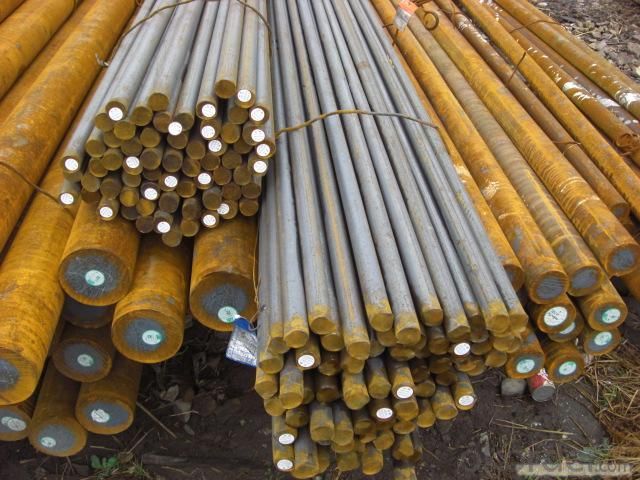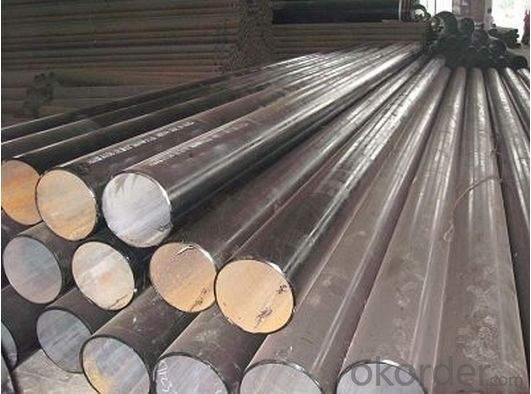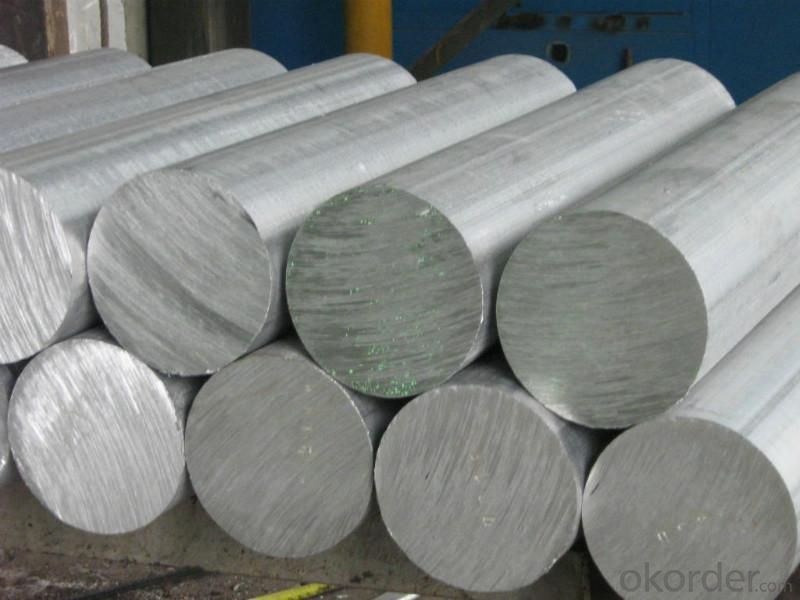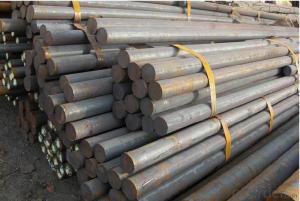S65C Alloy Steel Bar Round Flat Square Shape
- Loading Port:
- Tianjin
- Payment Terms:
- TT OR LC
- Min Order Qty:
- 25 m.t.
- Supply Capability:
- 50000 m.t./month
OKorder Service Pledge
OKorder Financial Service
You Might Also Like
Item specifice
S65C Alloy Steel Bar Round Flat Square Shape
Product Description:
1. Sizes: Diameter: 16mm-300mm; Length: 6m, 9m, 12m
2. Grade: S65C
3. Invoicing on theoretical weight or actual weight as customer’s request
4. Shape: Round bar, solid bar of steel with circular section
5. Technique: Hot rolled, forged, cold rolled
Specifications:
Material | S65C | Round bar | Dia(mm) | Max 700 |
Process | EAF + LF + VD + Forged + Heat Treatment (optional) | Length (mm) | Max 12000 | |
Heat treatment | Normalized / Annealed / Quenched / tempered | Plate bar | Thickness(mm) | Max 200 |
Delivery condition | Hot forged +Rough machined (black surface after Q/T)+ Turned (optional) | Width(mm) | Max 3000 | |
Test | Ultrasonic test according to SEP 1921-84 D/d | Length (mm) | Max 12000 |
Chemical Composition:
Standards: ASTM,JIS,GB,EN(DIN,BS,NF)
Grade | C | Si | Mn | Cr | Ni | Cu |
AISI 1055 | 0.62~0.70 | 0.17~0.37 | 0.50~0.80 | ≤0.25 | ≤0.30 | ≤0.25 |
Delivery condition:
EAF+LF+VD+(ESR), rolled / forged, annealed / Q+T, black/peeled/turned, UT tested
Application:
Carbon steel rod applies to chemical industry, shipping industry,manufacturing industry, construction, decorate industry, electric power, pump shafts, sanitary wares, furniture handles, boiler, high temperature resistant,low temperature resistant,corrosion resistant
Sales Information:
Material | High Quality Carbon Structural Steel S65C |
Size | Diameter:10-700mm Length:6000mm-12000mm |
Origin place | Made In China |
Delivery Condition | Hot rolled, cold drawn, forged |
Surface require | Black, grinding, bright, polish |
Heat treatment | Quenched, Tempered, annealed |
Packing | Seaworthy packing ,wooden case ,carton,woven bag or at client's requires |
Delivery time | According to order’s quantity. |
Trade Term | EXW,FOB,CIF |
Payments | T/T or L/C at sight |
Port | China main Port, such as shanghai, Dalian, Shenzhen port. |
MOQ | 25 Metric Ton |
Product show:



- Q:Is special steel suitable for structural applications?
- Yes, special steel is suitable for structural applications. Its unique properties such as high strength, durability, and resistance to corrosion make it an ideal choice for constructing buildings, bridges, and other infrastructure where structural integrity is crucial. Special steel also offers excellent weldability and formability, allowing for versatile design possibilities in structural applications.
- Q:Can special steel be used for electrical applications?
- Yes, special steel can be used for electrical applications. Special steel has excellent electrical conductivity and can be used in various electrical components and equipment like power transformers, generators, electrical motors, and electrical transmission systems.
- Q:What are the different forging grades of special steel?
- There are several different forging grades of special steel, including but not limited to stainless steel, alloy steel, carbon steel, tool steel, and high-speed steel.
- Q:How does special steel perform in terms of corrosion resistance in marine environments?
- Special steel, also known as stainless steel, performs exceptionally well in terms of corrosion resistance in marine environments. The high levels of chromium and nickel present in the alloy composition of special steel make it highly resistant to corrosion caused by saltwater and other corrosive elements present in marine environments. The chromium content in special steel forms a protective oxide layer on its surface known as the passive layer. This passive layer acts as a shield, preventing the steel from coming into direct contact with corrosive elements. It effectively blocks oxygen and moisture from reaching the underlying steel, thereby inhibiting corrosion. Additionally, the presence of nickel in special steel enhances its corrosion resistance even further. Nickel improves the stability of the passive layer and increases its ability to self-repair if it gets damaged. This property makes special steel highly reliable and long-lasting in marine environments, where exposure to saltwater, high humidity, and varying temperatures can accelerate corrosion processes. Furthermore, special steel offers excellent resistance to pitting corrosion and crevice corrosion, which are common types of corrosion encountered in marine environments. Pitting corrosion occurs when localized areas of the steel's surface are attacked, resulting in small pits or holes. Crevice corrosion occurs in confined spaces such as gaps or joints, where stagnant water or debris can accumulate and accelerate corrosion. Special steel's resistance to these types of corrosion ensures its durability and integrity in marine applications. Overall, special steel demonstrates outstanding corrosion resistance in marine environments due to its high chromium and nickel content. Its ability to form a protective passive layer, resist pitting and crevice corrosion, and self-repair makes it a preferred choice for various marine applications, including shipbuilding, offshore structures, and seawater desalination plants.
- Q:What are the applications of special steel in the automotive manufacturing process?
- Special steel is widely used in the automotive manufacturing process for various applications. It is commonly used for making engine components like crankshafts, camshafts, and connecting rods due to its high strength and resistance to wear and heat. Special steel is also used for manufacturing suspension systems, steering components, and chassis parts, as it offers excellent mechanical properties and durability. Additionally, special steel is utilized in the production of safety features such as seatbelt components and airbag systems, ensuring the highest level of protection for occupants. Overall, special steel plays a crucial role in enhancing the performance, reliability, and safety of vehicles in the automotive industry.
- Q:How does special steel contribute to the toughness of products?
- There are several ways in which special steel enhances the toughness of products. Firstly, its high strength and durability are well-known. Specific alloying elements and heat treatment processes are used in its manufacturing, which improve its mechanical properties and make it more resistant to wear and tear. As a result, products made from special steel can withstand heavy loads, impacts, and harsh environments, making them tougher and less prone to breakage. Moreover, special steel possesses excellent corrosion resistance properties. This is achieved by adding specific alloying elements like chromium and nickel, which create a protective layer on the steel's surface, preventing rust and corrosion. The ability to resist corrosion adds to the toughness of the products since they can be used in corrosive environments without experiencing degradation or loss of performance. Furthermore, special steel offers enhanced heat resistance. It can endure high temperatures without compromising its structural integrity or mechanical properties. This is particularly valuable in industries such as aerospace, automotive, and energy, where components are subjected to extreme temperatures. The capacity of special steel to maintain toughness under high heat conditions contributes to the overall reliability and longevity of the products. Additionally, special steel can be customized to meet specific requirements. Manufacturers can tailor the composition and properties of the steel according to the intended application. For instance, various types of special steel alloys are utilized in the production of cutting tools, bearings, and structural components. By selecting the appropriate grade of special steel, manufacturers can optimize the toughness of their products, ensuring they can withstand the intended use and perform reliably. In conclusion, special steel enhances the toughness of products through its high strength, corrosion resistance, heat resistance, and customizability. The distinctive properties of special steel make it an ideal choice for a wide range of applications where toughness and durability are essential factors.
- Q:Can special steel be used in the semiconductor manufacturing industry?
- Yes, special steel can be used in the semiconductor manufacturing industry. Special steel alloys, such as stainless steel and tool steel, are often used in the construction of semiconductor equipment and components. These steels are chosen for their high strength, corrosion resistance, and thermal stability, which are essential properties for withstanding the harsh environments and processes involved in semiconductor manufacturing. Additionally, special steel can be engineered to have low levels of contamination, making it suitable for applications where purity is crucial, such as in cleanroom environments.
- Q:Is special steel suitable for electrical and electronic applications?
- Yes, special steel is suitable for electrical and electronic applications. Special steel is often used in electrical and electronic applications due to its excellent conductivity, high strength, and resistance to corrosion and wear. It is commonly utilized in the manufacturing of electrical connectors, circuit breakers, transformers, and various other components in the electrical and electronic industry.
- Q:How does the heat treatment process affect the hardness of special steel?
- The hardness of special steel is greatly influenced by the heat treatment process. This process involves heating the steel to a specific temperature, maintaining it at that temperature for a certain period, and then cooling it at a controlled rate. By altering the microstructure of the steel, the heat treatment process impacts its hardness. Quenching, which is one of the most commonly used heat treatment techniques, involves rapidly cooling the steel. This results in the formation of martensite, a hard and brittle microstructure. The rapid cooling prevents the formation of softer microstructures like pearlite or ferrite, leading to an increase in the steel's hardness. Tempering is another heat treatment process that affects the hardness of special steel. After quenching, the steel is often tempered to decrease its brittleness and enhance its toughness. This involves reheating the quenched steel to a lower temperature and then slowly cooling it. Through this process, some of the martensite transforms into a more ductile microstructure, such as tempered martensite or bainite. These microstructures retain some of the hardness of martensite while also providing improved toughness and resistance to fracture. To summarize, the heat treatment process plays a significant role in determining the hardness of special steel. Quenching increases hardness by forming martensite, whereas tempering balances hardness with improved toughness. By adjusting parameters such as temperature and cooling rate, the desired hardness and mechanical properties can be achieved for different applications of special steel.
- Q:Can special steel be used for manufacturing tools?
- Yes, special steel can definitely be used for manufacturing tools. Special steel refers to a specific type of steel that is carefully engineered and designed to possess certain properties and characteristics that make it suitable for specific applications. In the case of manufacturing tools, special steel is often preferred due to its exceptional strength, hardness, and durability. These properties enable tools made from special steel to withstand high levels of stress, wear, and impact, making them ideal for demanding applications such as cutting, drilling, shaping, and machining. Additionally, special steel can also exhibit excellent heat resistance, corrosion resistance, and dimensional stability, further enhancing its suitability for tool manufacturing. Overall, the use of special steel in tool production ensures the creation of high-quality, long-lasting, and efficient tools that can effectively perform various tasks in different industries.
1. Manufacturer Overview |
|
|---|---|
| Location | |
| Year Established | |
| Annual Output Value | |
| Main Markets | |
| Company Certifications | |
2. Manufacturer Certificates |
|
|---|---|
| a) Certification Name | |
| Range | |
| Reference | |
| Validity Period | |
3. Manufacturer Capability |
|
|---|---|
| a)Trade Capacity | |
| Nearest Port | |
| Export Percentage | |
| No.of Employees in Trade Department | |
| Language Spoken: | |
| b)Factory Information | |
| Factory Size: | |
| No. of Production Lines | |
| Contract Manufacturing | |
| Product Price Range | |
Send your message to us
S65C Alloy Steel Bar Round Flat Square Shape
- Loading Port:
- Tianjin
- Payment Terms:
- TT OR LC
- Min Order Qty:
- 25 m.t.
- Supply Capability:
- 50000 m.t./month
OKorder Service Pledge
OKorder Financial Service
Similar products
New products
Hot products
Related keywords






























